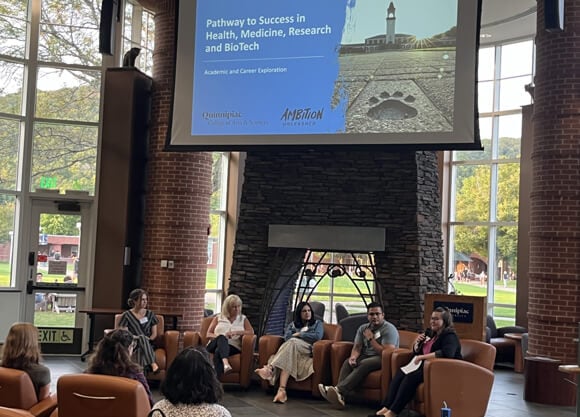
Pathways to Success Exploration Week inspires Bobcats to unleash their talents
September 23, 2024

September 23, 2024

Offering insightful discussion panels and networking sessions in the Carl Hansen Student Center Piazza from September 16 through September 19, the program brought together workforce alumni, faculty and current graduate students with students who are exploring a course of study or are currently in a major.
The event was produced as a facet of the College of Arts and Sciences' Career Development’s collaborative work with faculty to support a faculty-driven advising program incorporating academic advising, experiential and work-integrated learning and career development.
“We put this event together so our students could have some perspective from both current students, faculty, and employers around all the opportunities they have for both academic and career exploration,” said Rick DelVecchio, director of career development.
Explored through the lens of 26 different College of Arts and Sciences program majors, Pathways to Success helped bring in to focus the wide variety of academic and career pathways which can inspire students to apply their interests and talents to a complementary profession.
Three Pathway to Success panels discussed opportunities in the fields of Computing, Technology, Human Resources, and Administration; Government, Public Administration, Human Services, Law, Policy, and Non-Profit; and Health, Medicine, Research and BioTech.
College of Arts and Sciences Advising Specialist Elyssa Wrubel moderated the Health, Medicine, Research and BioTech discussion on September 17. Panelists included Nita Verma Prasad, professor of history, Director of Health, Medicine and Society major and Director for Asian Studies minor; alumnus Angela McNabloa ’98, an immunology and respiratory research scientist with New York-based Boehringer-Ingelheim; and Frank H. Netter MD School of Medicine candidates Gaurav Dangol, MD ’27 and Lindsey Simoncini, MD ’27.
Prasad said undergraduates interested in healthcare graduate studies can begin to build their portfolio by becoming involved with medical volunteerism through local groups and nonprofits.
“Consistently engaging with those kinds of programs are critical in rounding yourself out as a candidate,” said Prasad.
Prasad also advised undergraduates to get involved in organizations and extracurricular activities in their field of interest.
“Very few post-graduate programs are interested in students who spend all of their time studying. They’re looking for candidates who interact well with others, know how to manage their time, and have good organizational skills,” said Prasad.
Prasad also noted that the field which catches an undergraduate’s interest may evolve and change during their course of study; so it’s important to keep their options open.
“The field that you’re interested in could change quite a bit. I think making sure that, as an undergraduate, you’re choosing majors and choosing a course of study that keeps your options open within the field of health is probably one of the smartest things to do,” Prasad said.
Dangol discussed the pathway which led him from his undergraduate degree in Public Health to earning a Master’s in Global Public Health, followed by time teaching as well as working with the New York City Department of Health. At Quinnipiac, he is pursuing an MD with a concentration in Medical Humanities. Dangol said the concentration complements the varied points he has accessed along his pathway to a career in medicine.
“I took four years off between my undergrad and starting medical school, and I don’t that was time wasted at all. I very much valued my time off because that allowed me to really figure out whether I wanted to go into medicine or not, and also to figure out what kind of physician I wanted to be,” said Dangol.
Even if students are already committed to a certain route, McNaboloa advised the undergraduates to seek out opportunities to become exposed to different areas of interest.
“We had some medical students come into the laboratory and spend a few days in the pathology lab or blood bank. They were some of the best physicians, because they understood the support people that help them to care for their patients,” McNaboloa shared. “So it may be something you haven’t even thought about. Seek out any opportunity and put yourself out there. Don’t be afraid to talk to people and to network.”
“My biggest piece of advice would be to stay open,” said Simoncini. “Going into undergrad, I thought electives were just checking off a box. But then I realized that there are so many different electives you can take that will fulfill your requirements for graduation, but also will expose you to new areas and new people. When I was a biology major, I found that spending so much time with other people in biology meant I was missing out on all the other rich perspectives of my fellow classmates.”
Students were encouraged to ask their own questions of the different groups of guest panelists and to join them for networking sessions following each discussion. The event’s closing Pathway program on September 19 helped College of Arts and Sciences students explore how minors can enhance their academic and professional endeavors.
“All of our students are explorers, whether they’ve already determined their academic path, and they need to determine a career path, or if they’ve determined both and they’re looking to identify a specific track within the career path they’ve chosen,” DelVecchio said. “We thought this was a great opportunity to get them connected with the people who could help them do that exploration.”
Quinnipiac Today is your source for what's happening throughout #BobcatNation. Sign up for our weekly email newsletter to be among the first to know about news, events and members of our Bobcat family who are making a positive difference in our world.
Sign Up Now